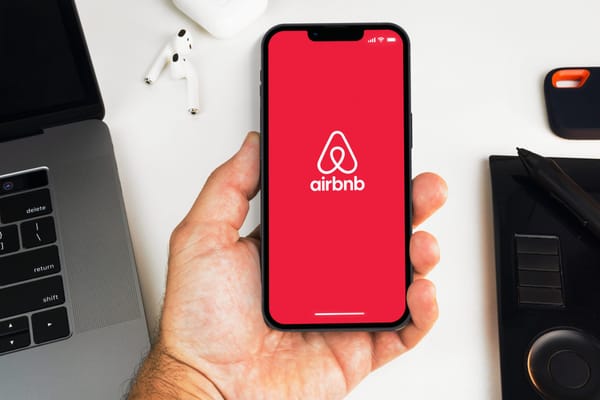Vacation Rental Industry Trends for 2021 Shared by Experts [Report]
![Vacation Rental Industry Trends for 2021 Shared by Experts [Report]](/content/images/size/w1200/wordpress/2021/02/vacation-rental-industry-pic1-.jpg)
In 2020, countless industries, particularly the vacation rental industry, felt the effects of the global COVID-19 pandemic. Travel restrictions and bans on international flights meant that industry stakeholders had to think outside of the box. There’s no denying that 2020 was unprecedented and tough. Yet, the vacation rental industry managed to keep going and displayed exceptional resilience.
As one of the industry leaders, the team at iGMS always keeps up to date with the most recent developments. We have analyzed how the industry has changed in the past year and identified the valuable lessons and trends that can help homeowners and property managers in the new year. To get a view from different perspectives, we have also asked industry experts to share their vision on the foreseeable future of the vacation rental market.
We are optimistic about what the future holds. Several vacation rental industry statistics and surveys show that people have a strong urge to take to the road again. According to the Travel Leaders Group survey conducted together with the World Travel & Tourism Council (WTTC), 70% of respondents stated that they plan to take a holiday in 2021.
The Impact of the COVID-19 Pandemic on the Vacation Rental Industry (Statistics)
In January 2020, China experienced the first negative effects of the pandemic. As the coronavirus spread, many other countries across the globe started to impose strict lockdowns. So much so that international travel almost came to a halt. This caused huge losses for the global vacation rental market and affected its previously rapid annual growth rate.
Here are some of the effects of the COVID-19 pandemic and how the situation developed during 2020.
1. Global booking volume dropped
According to Airbnb’s data, the global booking volume dropped by 42% in March 2020. Then, in April, it took another turn for the worse and reached its lowest level when it dropped by 72% compared to 2019.
By June, the numbers improved. Though, they were still lower compared to 2019. Sadly, the second wave of the coronavirus pandemic hit many countries across the globe in the last quarter of 2020. This meant that the short-term rental market failed to recover completely by the end of 2020.
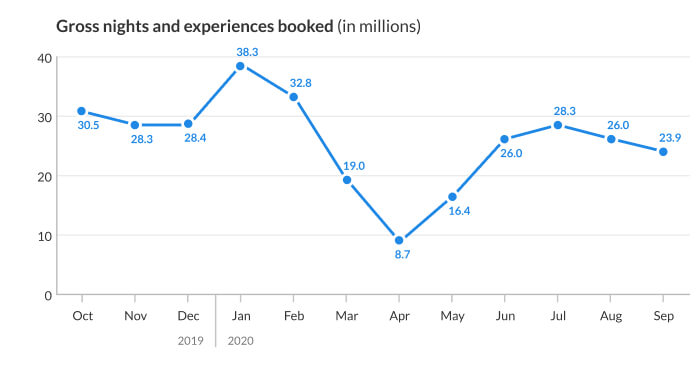
2. Cancellations and booking alterations increased
An increase in booking cancellations was another major challenge that vacation rental owners had to face in 2020. In April, the industry reached its lowest level of global bookings. Plus, our data also reveals that in April the number of cancellations increased by 70% compared to the last quarter of 2019. In fact, Airbnb’s data reveals that in March and April there were more cancellations than new vacation rental bookings. Luckily, the number of cancellations improved towards the end of 2020 with about 2 out of every 10 bookings getting canceled.
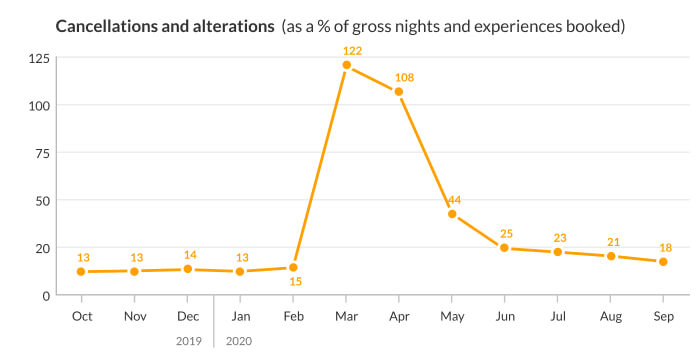
As guests were more inclined to cancel or alter their bookings, hosts had to change their cancellation policies. Many opted for free and flexible cancellations to help attract new bookings. In 2021, hosts are still advised to use these cancellation policies. Flexibility is important as travelers still can’t be certain about how the pandemic might affect their travel plans.
3. The average nightly rate increased
It might come as a surprise but the average nightly rate actually increased in 2020. While hosts initially decreased their nightly rates by almost 60% at the beginning of the pandemic, this changed in June.
As occupancy rates were lower, hosts had to increase pricing for their offerings to keep their income steady. According to our data, the average nightly rate in the US reached its highest at $202.5 in July but continued to be higher for the rest of 2020 compared to 2019.
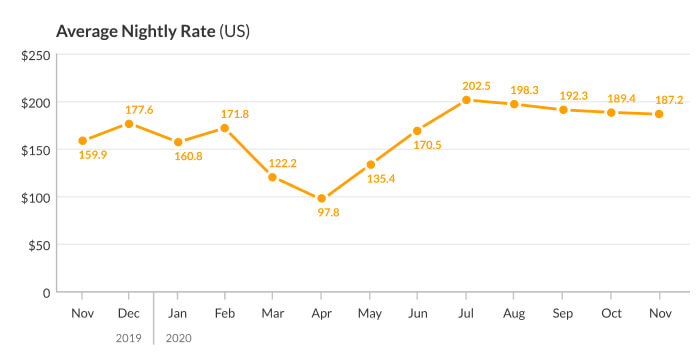
4. Vacation rental revenue dropped
According to our data, vacation rental hosts reported a drop of 80-100% in revenue in the month of April! Considering loads of cancellations and a lack of new bookings, this huge drop in revenue was expected.
5. Increase in last-minute bookings and extended stays
In 2020, one of the predominant themes was uncertainty. Restrictions were imposed on short notice across the globe. Thus, it was much more challenging for travelers to plan trips in advance.
The increase in workations and staycations also meant that guests booked more extended stays. In November 2019, the average stay was 3.4 days. In November 2020, the average stay increased to 4.9 days.
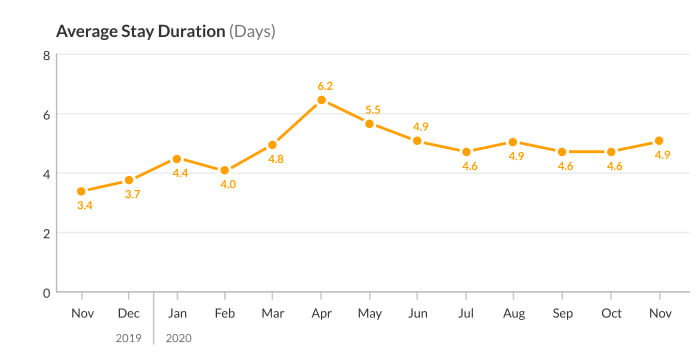
The Vacation Rental Industry Trends for 2021
Although it is still unclear when we’ll see a full recovery of travel, there were the first promising signs of a revival in the last months of 2020. Daniela Andreevska from Mashvisor says:
“In October, our team conducted an analysis of nationwide Airbnb data to evaluate the impact of the COVID-19 pandemic on the US market. Our analysis of over 300 US cities shows that the national short-term rentals market is in recovery as Airbnb occupancy rates increased by an average of 13% between March (when they hit the lowest) and September. Meanwhile, Airbnb’s daily rates went up by 11% over the same period.
As always, location is a key factor in the real estate market. Recovery has not been the same throughout the nation, with the Midwest leading recovery and the South, generally, lagging behind.
The initial shock of the pandemic had a devastating effect on Airbnb businesses. In March, Airbnb hosts across the US witnessed sizable drops in both occupancy rates and – consequently – rental income. The declines were most pronounced in the cities most affected by the pandemic, such as Seattle, New York, Los Angeles, and many others. However, the relatively quick onset of market recovery by the fall, especially set against the lack of foreseeable resolution of the pandemic at that time, shows once again the resilience of the Airbnb market and its ability to always come back.”
![]()
It is difficult to predict the future, as there are many uncertainties and unforeseeable factors. But we know for sure that people still have a desire to travel and explore the world (even if it means just driving to a neighboring town)!
“You don’t know what you’ve got until it’s gone. People who regularly traveled for work or pleasure now have a void to fill. Friends and families who haven’t gathered in a year will be chomping at the bit to do so in 2021. The need to travel and the need to be social are core to humans.
With ample time to plan, expect people to take their’ dream trips’ in 2021-2022. That said, travelers will be overcome with jubilance to be away from home and finally gathered with friends, family, or colleagues. It is vital, now more than ever, to keep neighbor disturbances in check and protect the character of the community.” says Michael Goldin, the Director of Business Development at NoiseAware.
![]()
While most stakeholders couldn’t wait to wave goodbye to 2020, it is anticipated that some trends will continue into the new year. Here are some of the trends that will likely still dominate the vacation rental industry in 2021.
1. Domestic travel will remain robust
“I think that if 2020 has taught us anything, it’s that life is unpredictable and that we need to be highly adaptable and proactive to survive and succeed. Domestic travel and digital nomads will continue to be an important driver in the short-term rental market, as will outdoor accommodation such as camping, caravanning, and glamping. Family travel with pets will be increasingly common. If you haven’t already, now is the time to identify your guest avatar for 2021 and focus your efforts on appealing to that demographic.”
Damian Sheridan,
Founder of The Book Direct Network
![]()
We don’t expect domestic travel to decrease soon. So, make sure that your vacation rental property appeals to domestic travelers in 2021. You should also consider making it family-friendly (ideally, pet-friendly too) and provide a comfortable workspace.

It is key that you update your amenities. Domestic travelers tend to book longer stays and will welcome streaming services and other forms of entertainment. This will also help you to stand out from the competition. Also, ensure that your Wi-Fi connection is still sufficient. By adding these types of amenities, your vacation home will be suitable for the whole family (even those members who still need to work while on holiday).
In 2020, people have learned how to work from home, and employers have become comfortable with their employees working remotely. This has caused the “digital nomad” trend to accelerate and shift forward by at least 5 years. I expect this trend to continue in 2021, as an increasing number of workers will give up their urban homes to live in short-term rental properties in smaller cities for one to three months at a time. These travelers will be looking for fast internet and comfortable workspaces, and there’s a huge opportunity for hosts to cater to this group.”
Jasper Ribbers
Author of Get Paid For Your Pad
Co-founder of STR Legends
Co-founder of STR Profit Academy
![]()
2. Guests will continue searching for rentals with enhanced cleaning procedures
“Vacation rental owners will need to continue to emphasize enhanced cleanliness to give travelers peace of mind, this is no longer optional. However, as the vaccine allows more people to live their lives normally, travelers may become more interested in experiencing what they missed out on in 2020. Hosts that have rentals near popular destinations that have opened safely will be in higher demand towards the latter half of 2021.”
Alexandra Alvarado
Director of Marketing and Education
American Apartment Owners Association
![]()
Cleaning and sanitization are crucial for today’s short-term renters. According to research, 81% of travelers reported that they feel more comfortable staying at accommodation, knowing that it follows the enhanced cleaning protocol introduced by Airbnb.
It is also important to share information about your cleaning procedures in your listing description. If you still clean your property on your own, consider enlisting the services of a professional cleaner or cleaning company that specializes in vacation rentals. Also, if you still don’t charge a cleaning fee, be sure to add it in 2021.
3. Flexibility will be crucial for attracting new bookings
“Vacation rental reservations remain at a deficit of -40% and -60% in the US and EU respectively. Until airline demand experiences an uptick, trends are likely to continue, with volatile local demand subject to restrictions and debilitated international demand. Urban hubs and leisure markets with significant international demand, already feeling the impact, will continue to suffer through this trend. Whilst the first flag is likely to be flight data, keeping fingers on the pulse of demand with granular, forward-looking data insights is most critical to getting ahead of the erratic demand curve.”
Jade Tinsley
Head of Marketing at Transparent Intelligence
![]()
A flexible cancellation policy, self-check-in, and Instant Book will help you to increase your bookings. Last-minute bookings in the past might have made you suspicious, but increasingly more travelers have no other option. In the current climate, showing flexibility is not a weakness, it is a sign that you are proactive.
4. Rural and coastal destinations will be in the spotlight
“2021 is still going to be very unpredictable. Whilst I do think there is renewed optimism around the possibility of international travel, ‘normality’ is a long way off. This naturally means that demand will continue to be very strong for local, drive-to markets. That said, those in international destinations (or those in countries that had banned international visitors) will see demand pick up.
In fact, I suspect it’s happening already, with people researching travel options for summer 2021. We all want to escape! And, with that, will come lots of guest questions around cancellation policies, virus rates, cleanliness, and whether local economies are open. It’s therefore critical that every manager updates all their channels and websites with very clear information. Give guests the confidence to book with you over another business that hasn’t been as helpful and transparent as you.”
Andy McNulty
CEO of Touch Stay
![]()
Locations off the beaten path will continue to be popular, especially in the first two quarters of 2021. Vrbo reports that 61% of the US families said that they would like to visit an outdoorsy destination rather than an urban one.
Travelers will continue to prefer lesser-known destinations to avoid crowds while the vaccination process is still in progress.
Beach vacations, in particular, will be popular in 2021. The online searches for coastal destinations increased a lot towards the end of 2020. According to research by Expedia, destinations like Tulum, Playa del Carmen, and Cancun are some of the most popular destinations for 2021.
5. Diversification and listing with multiple OTAs will be important for a stable occupancy rate
During the pandemic, many hosts and vacation rental managers were forced to list on multiple platforms to reach more travelers. This vacation rental marketing strategy, more often than not, paid off. If you only list on one channel, you are in effect advertising your rental to only a limited number of travelers.
According to research by AirDNA, hosts who list on multiple channels earn twice as much as those who simply stick to one OTA. So, in the new year, read up on other channels like Booking.com, Expedia, Vrbo, and/or TripAdvisor and expand your reach. Then, after you have listed on more platforms, you can also post on social media about your listing(s).
6. The usage of vacation rental software and tools will remain crucial for scalability
In 2021, using vacation rental software and tools will continue to be important. Hosts will need to rely on technology and embrace automation to incorporate some of the trends mentioned like offering self-check-in and listing on multiple OTAs.
Software solutions and other automation tools can simplify the process of managing your property remotely. As social distancing will still be necessary for 2021, these tools become indispensable. In addition, they can also help to reduce your property management operations costs. This can help hosts to offset some of last year’s losses. In fact, at the start of the pandemic, we conducted a survey about the use of vacation rental software. The results of our survey showed that 71.4% of hosts did not consider reducing their automation software costs.
The pandemic increased the complexity of running a vacation rental business. It also strengthened the competition. With the help of technology, hosts and property managers can meet the rising standards and streamline their operations to make the most of 2021.
Vacation Rental Tools and Software Solutions for 2021

– A unified inbox to have all your messages organized within a single feed
– Automated triggered messaging to improve your response rate
– Guest reviews automation that can help you to receive more reviews in return
– Team management and task completion tracking
– Cleaning management with access control
– Payment processing via Stripe
– Smart tools to manage direct bookings
– Reporting functionality to track your business results.
iGMS is software that will literally put your business on autopilot by streamlining your daily tasks enabling you to focus more on business-scaling activities.
Nuki turns a smartphone into a smart key in only a few minutes. The smart lock offers full remote control of the door lock via the Nuki app on your smartphone from anywhere and anytime. The physical key can still be used to lock and unlock the door from the outside after Nuki has been mounted.
RemoteLock is the leading provider of cloud-based access control and smart lock management software. RemoteLock saves time, money, and manpower by consolidating connected locks onto an easy-to-use SaaS platform enabling customers to remotely control access for guests, employees, and support staff.
BeyondPricing is an automated dynamic pricing solution. They utilize real-time market data to ensure their price recommendations to maximize revenue and occupancy for hosts. Your listing will be updated daily based on changes in supply and demand in the market, day of the week, seasonality, and local events.
PriceLabs is a dynamic pricing tool for Airbnb and vacation rentals. It helps to manage prices and availability easily with data-driven insights and automation capabilities. The tool recommends prices based on market supply and demand, seasonal and day-of-week trends, special events and holiday predictions, and the number of days left to book.
StayFi uses a cloud-managed mesh WiFi system that is simple to install and monitor. You can easily keep track of all your networks remotely and prevent WiFi complaints from guests. Create your own custom branded WiFi splash page that every guest uses to log into your vacation rental’s WiFi. StayFi ensures every guest remembers your brand, not only Vrbo or Airbnb.
NoiseAware is a noise monitoring system that helps you quickly protect all your properties in one place from noise issues, property damage, and false complaints. The NoiseAware Dashboard provides you with intelligent insight into all of your properties.
Roomonitor is a device that allows you to track the noise levels in your short-term rentals all day, every day, thus avoiding any problems with neighbors or other tenants. Roomonitor measurement system uses algorithms to analyze the patterns of noise, in this way, there is no need to record the audio in the apartment, and the privacy of your guests will be totally safe.
Minut is a smart home monitoring system. The company provides an easy-to-install and privacy-safe solution for noise, motion, and temperature monitoring for Airbnb, Vrbo, serviced apartments, and other short-term rentals.
TouchStay provides a digital guest welcome book solution that allows you to store all your content in one single online location. TouchStay’s mobile app packages this content in an easy and beautiful form. You can share your guest welcome book by sending guests a link (no signup or app required to download!)
About the Author
Olga Vasylieva is the Content and Social Media Team Lead at iGMS. Olga is on a mission to help hosts and property managers grow their businesses and deliver an excellent guest experience. She is a travel enthusiast and is inspired by life in all its aspects.





